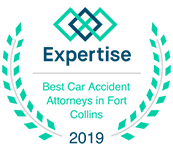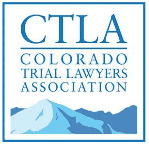Request a Free Consultation | No Upfront FeesSe Habla Español
970-225-2190 |
1-800-664-3151
Recent Blog Posts
What Happens if My Passenger Made Me Crash?
 Drivers are responsible for safely operating their vehicles. In a normal situation, the driver has sole and complete control over the vehicle's movements. Nearly all car crashes are caused by someone who is in the driver’s seat. However, the line between “driver” and “passenger” can become blurred when a passenger attempts to take control of a vehicle or interfere with the driver’s ability to do so. These reckless actions can very easily cause a needless accident. This type of event is not nearly as rare as you might think. Passengers can be held liable if they are in fact at fault for a crash. If you were injured in a car accident caused by a passenger, you should contact an attorney promptly. You may be able to recover compensation from your passenger.
Drivers are responsible for safely operating their vehicles. In a normal situation, the driver has sole and complete control over the vehicle's movements. Nearly all car crashes are caused by someone who is in the driver’s seat. However, the line between “driver” and “passenger” can become blurred when a passenger attempts to take control of a vehicle or interfere with the driver’s ability to do so. These reckless actions can very easily cause a needless accident. This type of event is not nearly as rare as you might think. Passengers can be held liable if they are in fact at fault for a crash. If you were injured in a car accident caused by a passenger, you should contact an attorney promptly. You may be able to recover compensation from your passenger.
When is a Passenger Liable for a Car Accident?
Even if you were doing everything right - eyes on the road, obeying all traffic laws - you still might end up getting hurt if your passenger does not share your responsible attitude toward road safety. In Colorado, you can hold a passenger legally liable for a car accident that they caused. These incidents frequently involve a passenger who is either intoxicated or enraged - or both - versus a sober driver.
Do I Need a Lawyer for My Car Accident Claim?
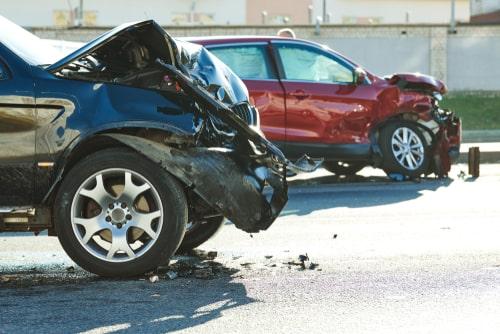 After a car crash, you have a long to-do list. Attend all your medical appointments. Seek counseling if the accident caused an emotional impact. Work on replacing or repairing your vehicle. Deal with the police if they are investigating. Report the accident to insurance. Get a lawyer? If you are unsure about whether you need an attorney to help you recover damages after a car accident, you probably do. A lawyer can help take the more technical side of dealing with a car accident claim off your plate so that you can focus on your own personal recovery. The safest thing to do is to reach out to a lawyer who can help you understand what his role would be and how he can help.
After a car crash, you have a long to-do list. Attend all your medical appointments. Seek counseling if the accident caused an emotional impact. Work on replacing or repairing your vehicle. Deal with the police if they are investigating. Report the accident to insurance. Get a lawyer? If you are unsure about whether you need an attorney to help you recover damages after a car accident, you probably do. A lawyer can help take the more technical side of dealing with a car accident claim off your plate so that you can focus on your own personal recovery. The safest thing to do is to reach out to a lawyer who can help you understand what his role would be and how he can help.
When Should I Get a Lawyer After a Car Crash?
Trying to handle a car accident claim on your own can be enormously stressful and time-consuming. Even if it was very obvious that another driver was at-fault, you may still encounter some resistance - and you might not get a fair offer. A lawyer will be better able to assess what your claim is worth and can fight to reach a fair settlement. In these circumstances, you will most likely benefit from being represented by counsel:
How Dangerous Are Tourists on the Road?
 Larimer County residents know how beautiful our landscape is. The natural beauty of our landscape, the opportunities for outdoor recreation - and of course, our legal marijuana - are all draws for tourists. Hosting visitors can be great for our local economy. It can be not-so-great for our road safety. You may have heard that most car accidents happen within a few miles of a person’s home, but tourists seem to habitually ignore this statistic and cause accidents quite far from their homes. Getting into a car accident can ruin a family vacation, but it can cause even bigger problems for the unfortunate locals who fall victim to a careless visitor. If you get hit by a non-local driver, quick action is important. You will want to get in contact with a lawyer as soon as possible.
Larimer County residents know how beautiful our landscape is. The natural beauty of our landscape, the opportunities for outdoor recreation - and of course, our legal marijuana - are all draws for tourists. Hosting visitors can be great for our local economy. It can be not-so-great for our road safety. You may have heard that most car accidents happen within a few miles of a person’s home, but tourists seem to habitually ignore this statistic and cause accidents quite far from their homes. Getting into a car accident can ruin a family vacation, but it can cause even bigger problems for the unfortunate locals who fall victim to a careless visitor. If you get hit by a non-local driver, quick action is important. You will want to get in contact with a lawyer as soon as possible.
Why Are Tourists Prone to Causing Car Crashes?
If you are driving along and abruptly get hit by a tourist, a few types of careless mistakes made by visitors might be the culprit. Common reasons tourists cause accidents include:
What to Do After a St. Patrick’s Day Car Accident in Larimer County
 Everyone loves St. Patrick’s Day, which falls on March 17 every year. This late-winter holiday is devoted to wearing green and celebrating Irish culture and heritage. Local delis work overtime producing literal tons of corned beef and other Irish fares. Festivals pop up featuring activities for all ages. Children may enjoy hunting for ever-elusive four-leaf clovers or setting leprechaun traps. Adults often enjoy green beer, Guinness, and Irish cream-based cocktails. Unlike corned beef and green T-shirts, sober drivers may be in short supply. Those who plan on driving on St. Patricks Day will need to exercise great caution. Unfortunately, even the most careful sober driver cannot always avoid getting into a wreck with a careless and unpredictable drunk driver. If a car accident with injuries ruins your holiday, it is a good idea to call an attorney as quickly as possible. You may have a strong case for a significant financial recovery.
Everyone loves St. Patrick’s Day, which falls on March 17 every year. This late-winter holiday is devoted to wearing green and celebrating Irish culture and heritage. Local delis work overtime producing literal tons of corned beef and other Irish fares. Festivals pop up featuring activities for all ages. Children may enjoy hunting for ever-elusive four-leaf clovers or setting leprechaun traps. Adults often enjoy green beer, Guinness, and Irish cream-based cocktails. Unlike corned beef and green T-shirts, sober drivers may be in short supply. Those who plan on driving on St. Patricks Day will need to exercise great caution. Unfortunately, even the most careful sober driver cannot always avoid getting into a wreck with a careless and unpredictable drunk driver. If a car accident with injuries ruins your holiday, it is a good idea to call an attorney as quickly as possible. You may have a strong case for a significant financial recovery.
Watch Out for "Scare Tactics" After Your Car Crash
 Some insurance companies will do just about anything to avoid paying out the full amount a claim is worth after one of their customers causes a car accident. They offer quick settlements that sound good but are not when you stop to add up all your expenses. If you are not represented, they may keep hounding you personally while you should be focusing on recovering from your injuries in an effort to pressure you into an unfair settlement. If none of that works, they just might resort to scare tactics. The safest thing to do after your car crash is to quickly find an attorney to who you can refer the insurance companies. When you are represented, it can take quite a bit of the guesswork out of settling your insurance claim.
Some insurance companies will do just about anything to avoid paying out the full amount a claim is worth after one of their customers causes a car accident. They offer quick settlements that sound good but are not when you stop to add up all your expenses. If you are not represented, they may keep hounding you personally while you should be focusing on recovering from your injuries in an effort to pressure you into an unfair settlement. If none of that works, they just might resort to scare tactics. The safest thing to do after your car crash is to quickly find an attorney to who you can refer the insurance companies. When you are represented, it can take quite a bit of the guesswork out of settling your insurance claim.
What Types of Insurance Company Scare Tactics Should I Look Out For?
Remember - the insurance representative calling you is trained to get crash victims to agree to the lowest possible settlement. They are skilled at this. You probably know better than to take the first offer, but you might be less familiar with what happens after you turn it down. There is a substantial chance that the insurance company might try to frighten you into taking a settlement. The scare tactics they use might include:
Liability When a Truck Driver Is Injured and Not at Fault
 You may often hear about careless truck drivers who injure careful drivers of smaller vehicles. It may even seem like when there is an accident involving a truck, the truck driver is at-fault 100% of the time. This simply is not true. Truck drivers can get hurt in accidents they did not cause, just like every other driver on the road. Even in truck verses car accidents, the truck driver is not always to blame. Truck drivers sometimes find themselves facing lawsuits after a crash, even when a more detailed investigation would reveal that they did nothing wrong - and the other driver did.
You may often hear about careless truck drivers who injure careful drivers of smaller vehicles. It may even seem like when there is an accident involving a truck, the truck driver is at-fault 100% of the time. This simply is not true. Truck drivers can get hurt in accidents they did not cause, just like every other driver on the road. Even in truck verses car accidents, the truck driver is not always to blame. Truck drivers sometimes find themselves facing lawsuits after a crash, even when a more detailed investigation would reveal that they did nothing wrong - and the other driver did.
If you are a truck driver and you were injured in your line of work during a crash, you may want to speak to an attorney of your own. A qualified lawyer can take a closer look into your accident and identify your options for pursuing financial compensation.
Who Might Actually be Liable When a Truck Driver is Injured?
Can I Sue a Careless Driver If I Was His Passenger?
 Negligent drivers are a danger to everyone on the road - including those inside their vehicles. The passengers of a driver who carelessly causes a car crash are just as likely to be injured as those in the not-at-fault vehicle, assuming there is a second car involved at all. This sometimes happens to rideshare passengers as well, who know little or nothing about the person whose car they are getting in and have no way to assess in advance whether they are a safe driver. Generally, the passengers of a driver who negligently crashes the car will be able to recover, with limited exceptions.
Negligent drivers are a danger to everyone on the road - including those inside their vehicles. The passengers of a driver who carelessly causes a car crash are just as likely to be injured as those in the not-at-fault vehicle, assuming there is a second car involved at all. This sometimes happens to rideshare passengers as well, who know little or nothing about the person whose car they are getting in and have no way to assess in advance whether they are a safe driver. Generally, the passengers of a driver who negligently crashes the car will be able to recover, with limited exceptions.
If you were injured by the person who was driving the car you rode in, it is a good idea to seek out an attorney who has experience handling this particular type of case.
Will I Be Able to Recover From the Driver Whose Car I Was in?
The driver of a vehicle owes a legal duty to his passengers to use reasonable care to avoid causing an accident that leaves passengers injured. Passengers may experience intense feelings of terror and helplessness when the driver of the car they are riding in starts driving in a dangerous fashion, as they can do nothing to prevent a crash. In Colorado, as long as the driver of the car you were in can be proven negligent, you will be able to recover in most cases.
More Than Medical Bills - Compensation After a Serious Accident
 For many who have suffered a serious accident, medical bills are just the beginning. While your hospital or ongoing medical bills are likely to be substantial, simply having them paid by the individual or company that hurt you may not feel like nearly enough. Colorado state law says you could very well be right. The damages you can recover after a serious motor vehicle crash or other accident caused by someone’s carelessness are not limited strictly to your medical expenses. When your life has been permanently altered, you may be eligible for compensation above and beyond just the cost of the medical care you need. An experienced and aggressive attorney may be able to make the case that you should be compensated for additional economic and non-economic damages.
For many who have suffered a serious accident, medical bills are just the beginning. While your hospital or ongoing medical bills are likely to be substantial, simply having them paid by the individual or company that hurt you may not feel like nearly enough. Colorado state law says you could very well be right. The damages you can recover after a serious motor vehicle crash or other accident caused by someone’s carelessness are not limited strictly to your medical expenses. When your life has been permanently altered, you may be eligible for compensation above and beyond just the cost of the medical care you need. An experienced and aggressive attorney may be able to make the case that you should be compensated for additional economic and non-economic damages.
What Types of Compensation Could I Receive if an Accident Has Changed My Life?
What Is a No-Doubt Liability Car Accident?
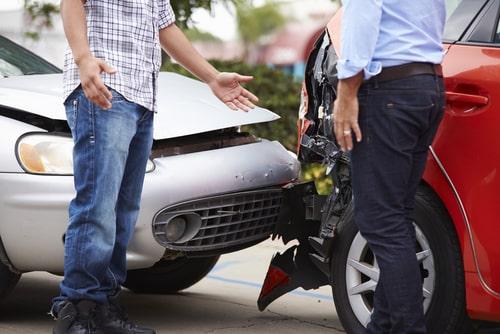 After some car accidents, it can be difficult to determine who was liable. Especially when multiple vehicles are involved, or there is a dispute over who merged into whose lane, figuring out which party is at-fault can become complicated. In other types of accidents, it is almost always immediately clear which driver made a careless mistake and caused the accident. These are often referred to as “no-doubt liability” accidents. Generally, recovering damages if you are injured in one of these accidents is a streamlined process.
After some car accidents, it can be difficult to determine who was liable. Especially when multiple vehicles are involved, or there is a dispute over who merged into whose lane, figuring out which party is at-fault can become complicated. In other types of accidents, it is almost always immediately clear which driver made a careless mistake and caused the accident. These are often referred to as “no-doubt liability” accidents. Generally, recovering damages if you are injured in one of these accidents is a streamlined process.
However, the at-fault driver may still try to make a case that there were extenuating circumstances that absolve him of liability. Because these claims can still be contested, it is a good idea to have an attorney ready to advocate for you before you try speaking to the other driver’s insurance company.
What Types of Car Crashes Are Considered No-Doubt Liability Accidents?
The 3 Careless Mistakes That Cause Rear-End Collisions
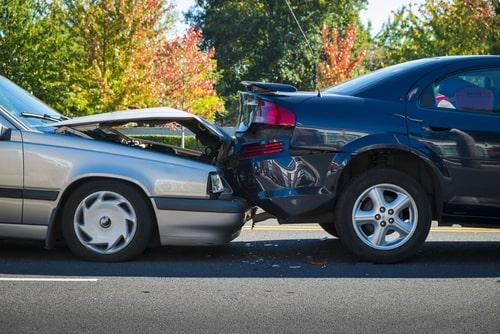 Rear-end collisions are almost never unavoidable. In almost all cases, they happen because someone acted negligently while behind the wheel. Rear-end collisions can be more serious than they initially appear. While they may not have the dramatic appearance of a head-on collision or a rollover, rear-end collisions frequently cause major head, neck, and spinal cord injuries. They can be particularly damaging to adults or children riding in the back seat, as they are closer to the impact and may be in a less supportive seat. If you were hurt in a rear-end collision, it is important to seek prompt medical attention, and then call a lawyer as soon as you are able to do so.
Rear-end collisions are almost never unavoidable. In almost all cases, they happen because someone acted negligently while behind the wheel. Rear-end collisions can be more serious than they initially appear. While they may not have the dramatic appearance of a head-on collision or a rollover, rear-end collisions frequently cause major head, neck, and spinal cord injuries. They can be particularly damaging to adults or children riding in the back seat, as they are closer to the impact and may be in a less supportive seat. If you were hurt in a rear-end collision, it is important to seek prompt medical attention, and then call a lawyer as soon as you are able to do so.
What Types of Driver Negligence Cause Rear-End Collisions?
A variety of careless mistakes can cause someone to rear-end another driver, but generally, they fall into three categories:
- Distraction - Distraction, in one form or another, is arguably the single most common culprit in rear-end collisions. Whether a driver is looking at their cell phone, trying to discipline a child in the back seat, digging around for a lighter, or even just lost in thought, drivers whose attention is off the road are much more likely to rear-end you. It is rather hard to crash into an unmoving object while adequately aware of it.

970-225-2190 | 1-800-664-3151
1403 W. 29th St.,
Loveland, Colorado 80538
Greeley:
3835 W. 10th Street, Unit 100,
Greeley, Colorado 80634|
970-460-2220
Longmont:
2204 18th Ave, Suite 123,
Longmont, Colorado 80501|
720-575-0509
Boulder:
4450 Arapahoe Avenue, Suite 100,
Boulder, Colorado 80303|
303-997-2018
Ft. Collins:
123 North College Ave., Suite 160,
Fort Collins, CO 80524|
970-225-2190
Cheyenne:
109 E. 17th St., Suite #6148,
Cheyenne, WY 82001|
307-227-4051 (By Appointment Only)




